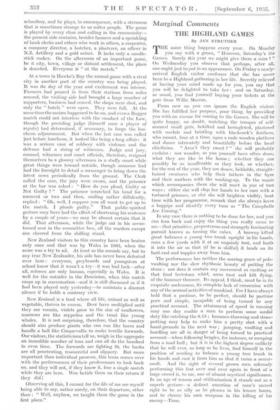Marginal Comments
THE HIGHLAND GAMES
By JAN STRUTHER
THE same thing happens every year. On Monday you say with a groan, " Heavens, Saturday's the Games. Surely this year we might give them a miss ? On Wednesday you observe that perhaps, after all; one ought just to put in an appearance. On Friday a newly- 'arrived English visitor confesses that she has • never been to a Highland gathering in her life. Secretly relieved at having your mind made up for you, you say that you will be • delighted to take her : and on Saturday, as usual, you find yourself buying your tickets at the gate from Willie Macrae.
From now on you can ignore the English visitor. She has fulfilled her purpose, poor thing, by providing you with an excuse for coming to the Games. She will be quite happy, no doubt, watching the troupes of self- assured small girls, bekilted and beringleted, plastered with medals and bristling with blackcock's feathers; who mount, four at a time; upon a rude wooden platform and dance intricately and beautifully before the local chieftains. " Aren't they sweet ? " she will probably exclaiin : nor wonder, as you yourself have often done; what they are like in the home ; whether they can possibly be as insufferable as they look, or whether; for the rest of the year, they are douce, biddable, straight- haired creatures who help their fathers in the byre and their mothers with the washing-Up. To the music which accompanies them she will react in one of two ways : either she • will clap her hands to her cars with a tortured grimace, Or else she will brighten visibly, beat time with her programme, remark that she always loves a bagpipe and identify every tune as " The Campbells Are Coming."
In any case there is nothing to be done for her, and you can lean back and enjoy the thing you really came to see—that primitive, preposterous and strangely fascinating pursuit known as tossing the caber. A brawny kilted giant balances a young tree trunk upright in his hands, runs a few yards with it at an ungainly trot, and hurls it into the air so that (if he is skilful) it lands on its butt-end and topples away from him.
The performance has neither the soaring grace of pole- vaulting nor the slow rhythmic beauty of putting the stone : nor does it contain any movement as exciting as that final teetotum whirl, arms taut and kilt flying, of the hammer thrower. Its appeal, I think, must be in its exquisite uselessness, its complete lack of connexion with any of the normal activities of mankind. For I have always held that a pastime, to be perfect, should be pastime pure and simple, incapable of being turned to any practical account. The attainment of speed in running may one day enable a man to perform some sordid duty like catching the 8.15 ; hammer-throwing and stone.; putting may help to make him a pretty shot with a hand-grenade in the next war ; jumping, vaulting and hurdling are all in danger of being turned to practical. account—when following beagles, for instance, or escaping from a mad bull ; but it is in the highest degree unlikely that he will ever, so long as he lives, find himself in the position of needing to balance a young tree trunk in his hands and cast it from him so that it turns a somer- sault. And the sight of several grown men solemnly performing this feat over and over again in front of a large crowd is, to me, one of almost mystical significance. In an age of reason and utilitarianism it stands out as a superb gesture—a defiant assertion of man's sacred right to be as silly as lie pleases in his leisure hours,' and to choose his own weapons in the killing of his enemy—Time.






































 Previous page
Previous page